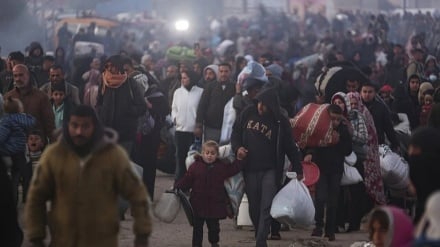Pars Today's Iran and world news package
How Iran’s “True Promise 1” operation darkened Israel’s days
-

A real image of the moment Iranian hypersonic missiles struck Israeli military buildings
Pars Today - The Islamic Republic of Iran’s “True Promise 1” operation against Israel has accelerated the decline in Israel’s GDP growth, the collapse of financial markets, and the standard of living for its residents.
The “True Promise 1” operation targeting the Zionist regime, carried out in the early hours of April 14, 2024, in retaliation for Israel’s attack on Iran’s consulate in Damascus, was followed by another operation, “True Promise 2,” on October 1, 2024, by the Islamic Revolutionary Guard Corps in response to the Zionist regime’s crimes against the people of Gaza and the assassination of resistance commanders.
According to Pars Today, citing Fars News, “True Promise 1” not only demonstrated Iran’s strength but also dealt severe blows to the economic foundations of the Zionist regime.
Credit shock and bleak economic outlook
One of the immediate consequences of the “True Promise” operation was the downgrade of Israel’s credit rating by Standard & Poor’s (S&P). The agency warned that Israel faces further downgrades, leading to reduced investor confidence in investing in Israel. Since the onset of the Gaza war on October 7, 2023, Israel’s credit rating has been downgraded five times by Moody’s and S&P, reflecting the war’s negative impact on Israel’s economy.
Paralysis of air transport and flight cancellations
Following the “True Promise” operation, dozens of foreign airlines suspended flights to the occupied Palestinian territories (Israel). While some resumed operations after a period, Iran’s second attack in October 2024 (“True Promise 2”) delivered a final blow, with even American Airlines announcing no flights to Israel until September 2025. This has severely disrupted Israel’s tourism, trade, and international communications.
Decline in exports and employment crisis
By targeting sensitive military bases and undermining internal psychological security, “True Promise 1” intensified crises in technology and exports. Israel’s Central Bureau of Statistics reported that GDP growth in Q2 2024 was only 0.3%, lower than the previous quarter. Exports of goods and services, particularly in energy and high-tech sectors, have sharply declined.
The mobilization of over 300,000 reservists for the war has caused significant labor market disruptions and reduced company productivity. Following Iran’s attack, Israel’s Central Bank lowered its 2024 growth forecast from 1.5% to 0.5% and kept interest rates unchanged for the sixth consecutive time. Israel’s economy remains in recession.
Surge in budget deficit and rising war costs
According to Israel’s finance ministry, the budget deficit in the second half of 2024 reached 8.8 billion shekels (approximately $2.34 billion), equivalent to an 8.5% GDP deficit, far exceeding the annual target of 6.6%. Bezalel Smotrich, Israel’s finance minister, admitted after “True Promise 1” that the current war is “the costliest in Israel’s history,” with costs reaching 250 billion shekels (about $68 billion).
Capital flight
The economic outlet Calcalist reported that over $40 billion in capital fled Israel following Iran’s April attack. Additionally, Globes noted that rising rents, especially for homes with safe rooms, have become a major issue for Israelis since the April attack.
A war beyond the battlefield
Iran’s “True Promise 1” operation was not only a military milestone but also a turning point in Israel’s economic decline. From credit rating downgrades, capital and airline flight, to escalating budget deficits and growing internal discontent, the operation’s impacts extend far beyond a few military bases and radars.
Initial assessments indicate that the attack imposed significant costs on Israel for repairs and infrastructure reconstruction. It also eroded investor confidence in Israel’s economic stability, negatively affecting financial markets and the stock exchange. Overall, Israel’s financial losses from the attack are estimated to be in the billions of dollars.
MG/ME


